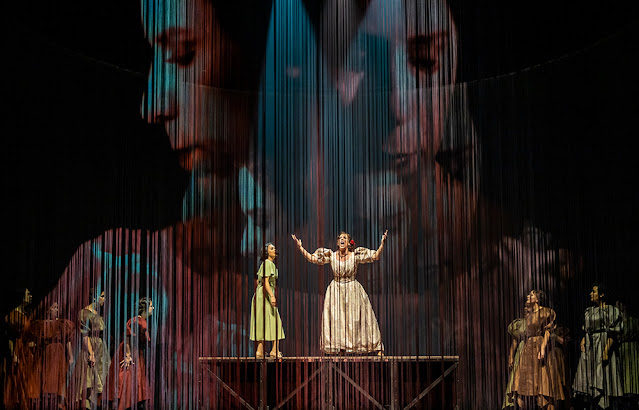Scottish Opera, 05/11/2022
Golijov : Ainadamar
Vocal Ensemble
Orchestra of Scottish Opera
Stuart Stratford
Aynadamar is the Arab name of a fountain (otherwise known as Fuente Grande) in the hills above Granada in Spain where, supposedly, Federico García Lorca was executed in August 1936. Created in 2006, Ainadamar is the first opera of Argentinian composer Osvaldo Golijov, set to a libretto by David Henry Hwang translated from English into Spanish by the composer. In a brief 80-odd minutes, it summarises the last years of the life of García Lorca through the eyes of his friend the Catalan actress Margarita Xirgu, who created the title role of García Lorca's first successful play, Mariana Pineda.
The story, slight as it is, is told in flashback; we begin at the end of Xirgu's life, as she's about to go on stage for the last time before her own death, still playing Mariana Pineda in memory of its author, whose legacy Xirgu has always sought to protect and promote. She reminisces about García Lorca in three stages, their first meeting, then an attempt to persuade him to leave Spain at the start of the Civil War, which fails, and finally his death, which is presented almost as a passion play, with clear parallels to the Crucifixion.
I'm strongly tempted to call the piece as a whole music theatre rather than opera, although that may partly be due to the work of director Deborah Colker. Colker is a choreographer and a movement director; apart from having her own dance company, she has directed events such as the opening ceremony of the 2016 Rio Olympics, and the Cirque du Soleil show Ovo, and as I would expect of anyone who has worked with and for Cirque du Soleil, she had a very integrated vision for this production too, with a very strong dance element alongside the vocal and musical one, as well as the use of video projection and highly atmospheric lighting.
 |
| Julieth Lozano (Nuria) and Lauren Fagan (Margarita Xirgu) Ainadamar, Scottish Opera (© James Glossop, 2022) |
Golijov's score certainly invites this, there's a good deal of dance-inspired music in it, notably with distinct flamenco roots, and Colker starts - and almost ends - the evening with a solo male dancer, in the characteristic arched pose of the flamenco dancer, in a spotlight in the centre of a stage bare save for a large, circular curtain of fine strands, on which images and texts are sometimes projected. There are four professional dancers in all, but the small, all-female chorus also dances, when required, and well, too. Given that the work as a whole is dramatically fairly static, laid out in a sequence of set pieces of one kind or another, the dance element was particularly welcome to bring life to the stage.
Elsewhere the music blends Judeo-Arabic influences and Cuban rumba with a more familiar classical technique, which produces a couple of particularly lyrical trios, and some electronically produced sounds, such as dripping water, gunshots, or spoken threats or prayers. The orchestra looked about average size, but with a hefty percussion section. It's a colourful score, with some interesting textures, and well-delivered by Stratford.
Margarita Xirgu is a soprano role, but she's pushed to the very depths of her register from the outset, while Ruiz Alonso, the Falangist officer who arrests García Lorca, and has him executed, is a cantaor, a flamenco singer. The role of García Lorca himself is a travesty role, for mezzo-soprano, so the vocal plateau as a whole is predominantly feminine. Margarita is the dominant figure of the work, though, it is her journey, her awareness and her regrets that we are following. presented as a kind of rondo, the scenes punctuated with a song ostensibly from and about Mariana Pineda, but also about García Lorca, and Margarita herself, and also with the piercing, chilling challenge of Ruiz Alonso's chant, compellingly delivered by Alfredo Tejada.
Samantha Hankey was García Lorca, grave and calm, wanting to give Spain - his Spain - its voice, while Julieth Lozano was a fresh-voiced Nuria, Margarita's protégée in the 'present' time scenes, wanting to hear her speak of García Lorca. However, Lauren Fagan shouldered the burden of the evening as Margarita, by turns playful or hieratic, earnest or anxious, actress turned emblem turned high priestess, as the years go by and she keeps the flame alight in exile. Vocally, the part goes all over the place, it sounded demanding, but Fagan handled it all with admirable ease.
It's a piece that comes a little close to outstaying its welcome; as it is, I found the ending a little stretched. However, Colker's vibrant production, with its strongly appealing dance element, and the textured shimmer of that curtain, certainly enhanced the score, and provided an engaging experience in the theatre.
[Next : 6th November]
